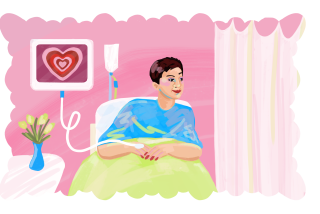Heart Attacks, a Stroke, Shingles--What’s Next?
- Share via
When I listed our recent household breakdowns the other day, I limited it for some reason to mechanical calamities, not personal.
I don’t know why I made this distinction, but perhaps it was because of some eerie suspicion that forces beyond the pale were involved, and perhaps I didn’t want to annoy them.
When you know that some evil entity has the power to break a pipe or make a faucet stick, you are inclined to treat it with respect, if not with awe.
Are the gods who control broken light bulbs more important than those who control broken kneecaps?
I was also guilty of some slipshod reporting, or perhaps over-dramatizing when I referred to my heart attack as disastrous. It seemed so at the time, but a few weeks later, when I got a second attack, the first one seemed almost benign by comparison.
My first attack evidently was a myocardial infarction. It occurred after prostate surgery at Huntington Memorial Hospital. It was a staggering blow. I called it devastating.
After I had generated a considerable amount of sympathy for this tale, the paramedics took me at four o’clock one morning to Los Angeles County USC Medical Center. Nine years previously, the paramedics had taken me to the same emergency room. My heart had stopped in emergency, and a young nurse had started it again with a shock and saved my life.
This time I suffered what was called congestive heart failure. After my condition had been stabilized, they moved me back to Huntington to be with my doctors. The doctors discovered that somewhere along the line I had also suffered a stroke. The stroke was truly devastating.
My previous accounts of my illness have identified only those symptoms that were evident after the post-prostate heart attack. Those suffered in the later stroke, whenever that was, were much worse. I cannot walk.
This is a fate much worse than any I ever imagined for myself. I haven’t been bad enough to deserve that, have I? There are no moral implications in broken light bulbs and leaky faucets, but when you start being punished for your general conduct, it makes you wonder. I am certainly no more guilty of bad manners than Job was. I’ve always thought that Job made a pretty good case for himself. If it comes down to my credentials against his, I think my case would stand up in court.
The odd thing is that I have had two shots at it. In the first one, my punishment was comparatively mild, though we see now that that judgment was relative. It didn’t seem so mild when I first began limping through Sycamore Grove on my daily walk with my wife. Also I felt quite justified when I applied for and received my handicapped parking permit. It has since been upgraded in validity.
At the time, to a man who had usually been sound of body, that being a given of life, I was seriously downgraded by the accident. Ever since then I have been wishing I could exchange the later attack for the first one. Talk about being unfair.
Even more strange than these apparent accidents are their number and sequence. No sooner had the first attack left me crippled than I was troubled by abdominal pains whose source I didn’t know. They finally became unbearable and I went to the doctor. He said, “You have diverticulitis.”
He prescribed an antibiotic and promised that the pain would be gone in three days. In three days the pain was worse. He told me to come in. Meanwhile I had developed some itchy sores in the small of my back. I assumed they were bites. But they were growing larger and more painful.
The doctor had me take my T-shirt off. He said, “You don’t have diverticulitis. You have shingles.” I was shocked. What a strange disease for a grown man to get. It was a virus held over from chicken pox and released when immunity was low. The doctor prescribed a pain killer and a specific. The pain continued for several days as the childhood disease attacked me in my old age.
I do not have appointments with my various doctors, but they show up on the scene from time to time in the hospital. One does not have old-fashioned talks as in the past. Generally I encounter one of them and try to zero in with a few pertinent questions before he gets away. One’s most meaningful dialogues with one’s doctor are usually conducted in this manner.
The other day I saw one of my doctors standing in my hospital room. He said hello and asked the usual inconsequential questions. He was Dr. Anchel Furman, an internist. I had talked to him briefly on several occasions. He was adept at the brief quizzical remark. I asked him, “Doctor, what misfortune will I suffer next?”
“No more, “ he said. “God is tired.”


